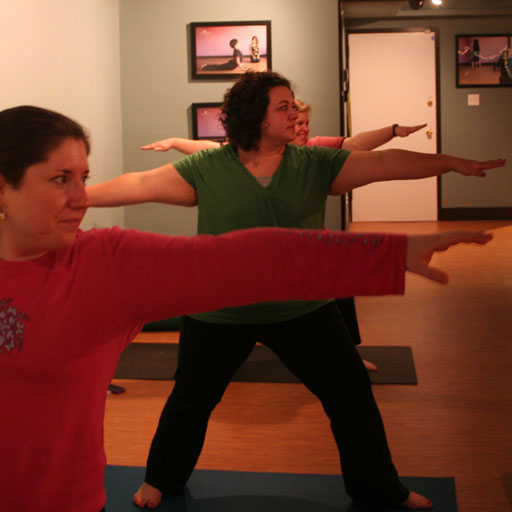
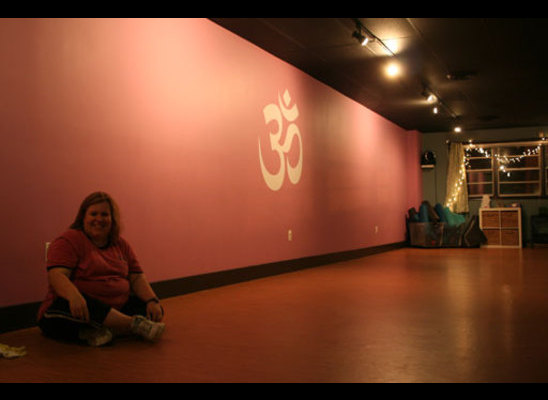
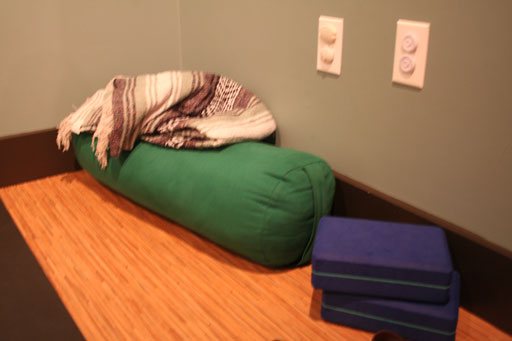
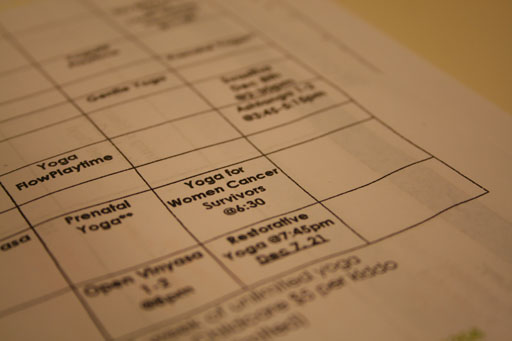
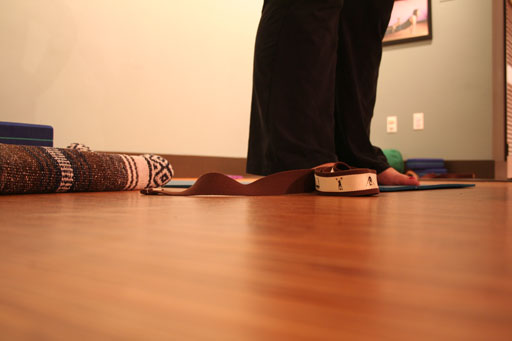
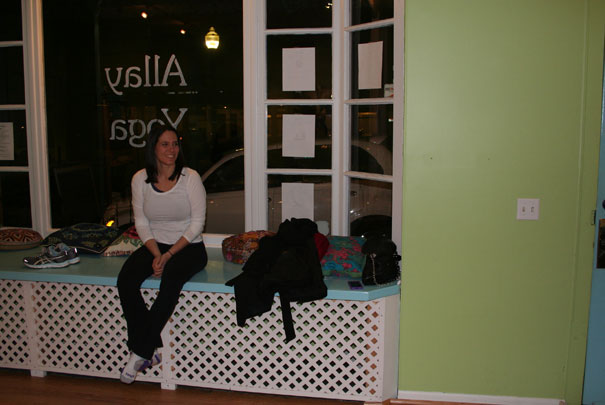
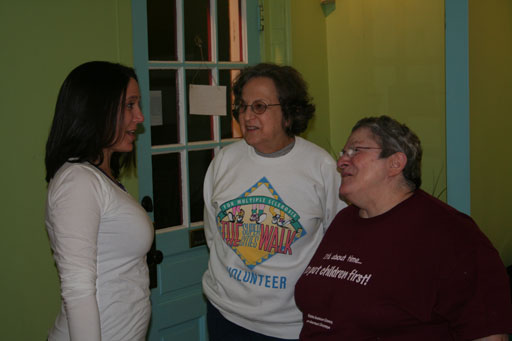
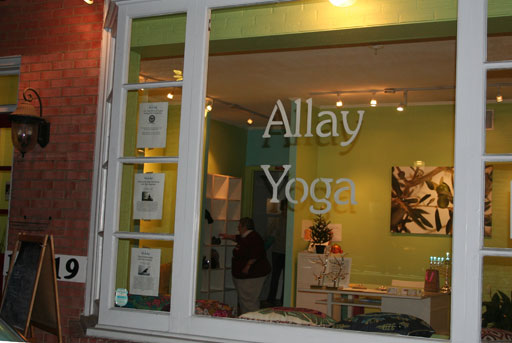
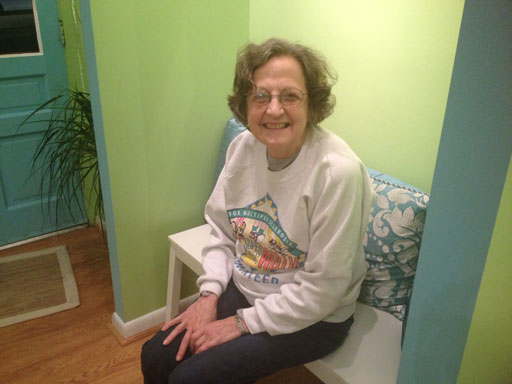
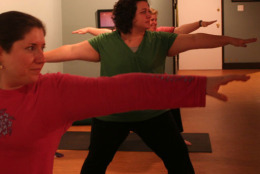
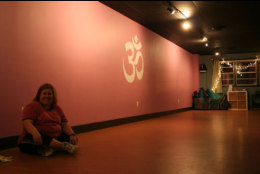
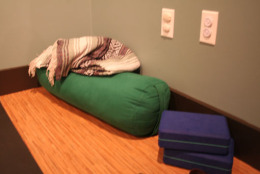

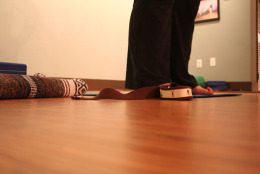
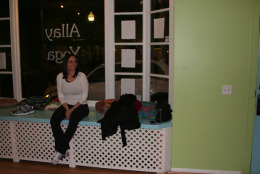
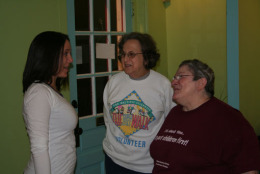
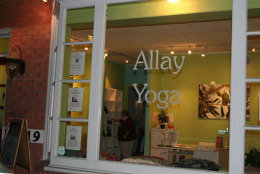
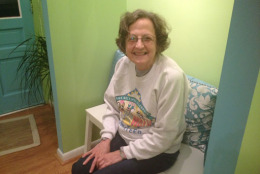
Megan Cloherty, wtop.com
WASHINGTON – She finds a place on her mat and closes her eyes, zoning in on herself and out on everyone around her. It’s easier for Emily Goodstein, 29, to do at this studio than it would be at many others. No one here is interested in competition and nearly everyone is overweight.
“No one there has a perfect body. We all have something that you could wish wasn’t there. We’re just laying that on the table. We’re not hiding anything,” says yoga instructor Dena Kahn.
Kahn teaches Kripalu yoga, and welcomes any level of experience, any level of health, and any size to her class. Kahn is growing a following in the D.C. area for teaching specialized classes to specific groups, including larger individuals and those who are suffering from chronic health conditions.
All of her classes are taught like traditional yoga, with room for modifications.
“So I will use my hands to move my flesh and my skin, to shift just as I would ask them to do,” Kahn says when describing how she teaches the Curvy class. “We’re talking about that all openly.”
Body-affirming yoga: “It’s not about weight loss”
The Curvy Yoga class, which this group affectionately calls “body-affirming yoga,” is growing in popularity. Goodstein attributes that to the group’s focus that’s placed on self-improvement rather than comparison.
“Yoga is a non-competitive practice by definition. So it’s kind of funny that we have to have a special space to do a non-competitive yoga practice. But I think a lot of times studios get sort of crowded and it’s really hard not to look at the downward dog of the person next to you,” Goodstein says.
Goodstein has been practicing yoga for seven years. She knows how it benefits her body, calms her mind and helps her focus. But she also knows many yoga practices don’t work for her. This “Curvy Yoga” class, held at lil omm yoga studio in Tenleytown, does.
“It’s not about weight loss. It’s definitely about pushing limits because I think at the end of the day, yoga is about breathing a millimeter beyond where you think your body can go. At the same time, it affirms exactly where your body is right now,” Goodstein says.
Classmate Patty Fitzgerald agrees, saying the class is personally tailored to her fitness level unlike other mainstream yoga classes.
“There wasn’t any sense of, ‘Here’s how you can modify the position because you’re 5 feet tall and not a skinny-minnie person,'” Fitzgerald says of more competitive classes.
In the body-affirming yoga class, participants are encouraged to go at their own pace, use stability blocks for balance and straps to reach stretching positions they can’t quite reach, but will benefit from.
“Somebody like me at 48, who again doesn’t have the typical yoga body, I want to get out of it the same thing anyone else is … And I’m doing positions and a practice in a way that I’m not feeling so totally stressed by what I can’t do,” Fitzgerald says.
Fitzgerald is pushing herself but says she’s doing it within what is possible. That is exactly what she is meant to get out of it.
“It’s a room of people who are regular people. Or who are people with bigger bodies. It’s not a room full of the Yoga Journal cover models,” Kahn says.
Regardless of participants’ starting points, Kahn says they’ll benefit from calming and connecting their mind and body through yoga.
“I think it’s helping you live better. It’s helping you live more healthfully. I think it’s helping you access life more fully, because if you can move better and you can breathe better, you get to live better,” Kahn says.
Gentle yoga: “A lot of students come in with vertigo, arthritis”
In a small studio in Kensington, Md., 66-year-old Penny Maza is suffering through a back spasm. They happen often to Maza, who sought out yoga as a means of coping with her arthritis. But in this gentle yoga class, she can take a minute and find the stretches she knows will relieve the pain.
“Over the last few years, I’ve developed very severe arthritis. In the process, I’ve gained a lot of weight. So, I’m not like I was when I was 30 in terms of things I could do,” Maza says.
Recognizing she had to do something to improve her quality of life, Maza reached out, emailing the Allay Yoga studio near her home to find a class she could get something out of, without having to worry about injury.
“I described myself. ‘I’m overweight, I’m old, I’m full of arthritis. Is there anyone who can help me?’ Ya know, I just made a plea,” Maza says.
She was paired with Kahn for a few individual classes until both felt Maza was ready to join a group in which she could have time for her own modifications.
“Sometimes I just really can’t do what the other people do. I do chair moves and so forth. I certainly feel a lot looser and more flexible after class,” Maza says.
She’s far from alone. Kahn says after experiencing an injury herself in a car accident, she understands how slowly strengthening your body with yoga can help improve confidence in your body while healing it.
It’s a tip she offers to anyone looking for a yoga instructor who will help them work through an injury – find a teacher who has experienced an injury.
Gentle yoga is offered at a number of studios across town and is popular with seniors and those who are rediscovering their body with a little less movement and flexibility than they’ve previously known. The pace of the class is slower, allowing participants time to feel comfortable in their own bodies.
“Anybody, regardless of their conditions, whether they have arthritis, osteoporosis, joint problems, whatever the issues are, they have time to set up in the way that’s best for them,” Kahn says.
The classes are physically challenging, but focus on balance, strength and flexibility primarily – all of which improve participants’ daily lives, Kahn says.
“They are parts of yoga that really add to your quality of life. You want to be able to move. You have safety in movement. You have safety when your body is strong. You have safety when you can balance.
For Penny Maza and her classmate Dorie Anisman, who suffers from multiple sclerosis, the balance portion of the class is especially helpful.
A few studios offer specialized yoga:
|
“You get to this age, you start to fear falling … What happens to me with arthritis and other difficulties I have, I really have to plan so that I don’t get hurt. That has been a real benefit for me,” Maza says.
While the class moves slowly, it’s challenging Maza says.
“I’m pushing the envelope for me. Other people can push their own envelope.”
Follow @WTOP on Twitter.
(Copyright 2012 by WTOP. All Rights Reserved.)







